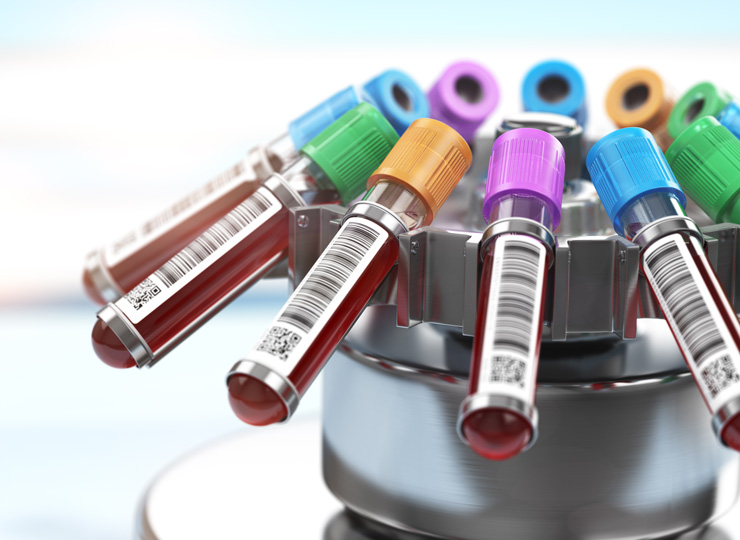
September 25, 2020
Scientists say they are getting closer to a blood test for Alzheimer’s disease, which would be much cheaper and easier to perform than current brain scans to detect the disease. An accurate blood test would allow for widespread diagnosis of Alzheimer’s at the earliest stages of the illness, when treatments may be most effective in slowing progression of the illness.
Two new studies looked at tau, a protein that forms the telltale brain tangles of Alzheimer’s disease. The tau tangles (also called neurofibrillary tangles) spread slowly through the brain of the person with Alzheimer’s, contributing in shutting down memory and thinking skills as the disease progresses. Tau exists in a number of forms, some of them being associated more specifically with Alzheimer’s disease. A specific form of modified tau called p-tau217 is also found in high amounts circulating in the blood of those with Alzheimer’s, researchers report.
One study, of 1,402 men and women living in Sweden, Colombia and the United States, found that the blood test for p-tau217 was 96 percent accurate in determining whether someone had Alzheimer’s disease versus another brain disorder. That figure is as accurate as expensive brain PET scans and spinal taps currently used to diagnose Alzheimer’s disease. It was more accurate than MRI brain scans and blood tests that detect the toxic protein beta-amyloid, another hallmark of Alzheimer’s disease.
The blood test was almost as accurate as a brain autopsy, currently the only way to diagnose Alzheimer’s definitively. The findings were published in the medical journal JAMA.
In another study, published in the Journal of Experimental Medicine, researchers at Washington University School of Medicine reported that blood measures of p-tau217 were more accurate than another form of tau in diagnosing Alzheimer’s in the early stages of the disease. The presence of the blood marker correlated highly with the presence of beta-amyloid buildup in the brains of those with Alzheimer’s disease, as measured by brain scans. The researchers are enrolling more than 1,000 patients in a follow-up study to learn more about how a blood test would perform in a typical clinic.
In most doctor’s office, it is difficult to diagnose Alzheimer’s disease and distinguish it from other disorders that may be causing memory loss and other symptoms. It requires a number of doctor visits over a long period of time, often a year or two, to fully evaluate a patient and diagnose the disease.
A simple and affordable blood test would greatly facilitate the diagnosis of Alzheimer’s years before the onset of memory loss and disordered thinking. The low risk of adverse side effects of a blood test also makes it more attractive, and such a test could be easily repeated regularly, every 6 or 12 months, for example, and perhaps even in a systematic way, just as we do a number of routine cancer screenings or cholesterol tests.
The researchers estimate that these promising results suggest that a blood test for Alzheimer’s could be commercially available in two to three years. Getting an Alzheimer’s diagnosis could one day be as easy as getting a test for cholesterol.
A cheap and effective blood test would also facilitate testing of new drugs and treatments for Alzheimer’s. New treatments could be evaluated for their efficacy early on, before damage to the brain becomes extensive. Importantly, blood tests could be used to monitor the response to promising new treatments that may slow or prevent the disease. This is also a crucial area of research that would benefit greatly from a blood test.
“Right now we screen people for clinical trials with brain scans, which is time-consuming and expensive, and enrolling participants takes years,” one of the study authors, Dr. Randall J. Bateman, a professor of neurology at Washington University School of Medicine, said earlier about his ongoing research on blood tests for Alzheimer’s. “But with a blood test, we could potentially screen thousands of people a month. That means we can more efficiently enroll participants in clinical trials, which will help us find treatments faster, and could have an enormous impact on the cost of the disease as well as the human suffering that goes with it.”
But experts increasingly believe that Alzheimer’s treatment needs to begin as early as possible, before memory loss and other symptoms arise. By the time people become forgetful, their brains are so severely damaged no therapy is likely to fully heal them. Detecting Alzheimer’s at the earliest stages may offer the best hope for delivering effective treatments.
By ALZinfo.org, The Alzheimer’s Information Site. Reviewed by Marc Flajolet, Ph.D., Fisher Center for Alzheimer’s Research Foundation at The Rockefeller University
Sources: Nicolas R. Barthelemy, Kanta Horie, Chihiro Sato, Randall J. Bateman: “Blood plasma phosphorylated-tau isoforms track CNS change in Alzheimer’s disease.” Journal of Experimental Medicine, July 28, 2020
Sebastian Palmqvist, Shorena Janelidze, Yakeel T. Quiroz, et al: “Discriminative Accuracy of Plasma Phospho-tau217 for Alzheimer Disease vs Other Neurodegenerative Disorders.” JAMA, July 28, 2020











